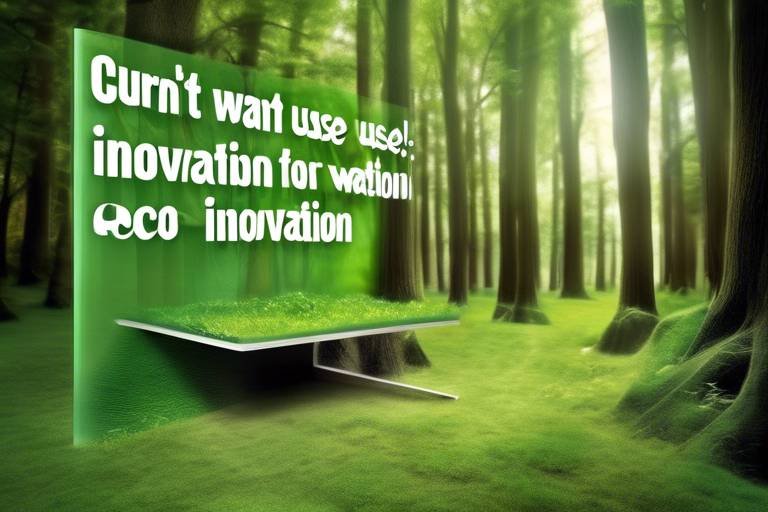Going Green - The Eco-Friendly Start-ups to Watch
In a world grappling with the consequences of climate change and environmental degradation, the rise of eco-friendly start-ups is nothing short of a breath of fresh air. These innovative companies are not just riding the wave of sustainability; they are actively creating it, paving the way for a greener future. From revolutionizing waste management to harnessing renewable energy, these start-ups are on a mission to transform industries and promote practices that ensure a healthier planet for generations to come.
Imagine a world where waste is minimized through smart technologies and community engagement, where energy is sourced from the sun and wind, and where fashion no longer comes at the cost of our environment. This is not just a dream; it’s the reality that many eco-conscious entrepreneurs are striving to achieve. As we delve into the various sectors being transformed by these start-ups, you’ll discover that sustainability is not just a trend; it’s a necessary shift that can lead to significant environmental benefits.
Each of these start-ups embodies a unique approach to sustainability, addressing different aspects of our daily lives. For instance, consider the innovative waste management solutions that are being developed. These companies are not merely focused on recycling; they are reimagining the entire waste lifecycle. By utilizing advanced technology and engaging communities, they aim to minimize landfill contributions and foster a circular economy where waste is viewed as a resource rather than a burden.
As we explore the renewable energy sector, it becomes clear that the shift to cleaner energy sources is vital for combating climate change. Emerging companies are harnessing solar, wind, and other renewable resources, providing cleaner alternatives that not only reduce carbon footprints but also empower consumers to make more sustainable choices. Just picture your home powered by the sun, reducing your electricity bill while also contributing to a healthier planet.
The fashion industry, notorious for its environmental impact, is also undergoing a transformation thanks to start-ups dedicated to sustainable practices. These companies are championing the use of eco-friendly materials, ethical labor practices, and innovative recycling methods that aim to change the narrative of fashion from fast to sustainable. It’s a revolution that not only benefits the planet but also appeals to consumers who are increasingly seeking out brands that align with their values.
Transportation is another critical area where these eco-friendly start-ups are making waves. With carbon emissions from vehicles contributing heavily to climate change, companies are innovating electric vehicles, bike-sharing programs, and public transport solutions that promote cleaner commuting options. Imagine a city where electric buses and bike lanes dominate the streets, creating a healthier environment for everyone.
On the food front, the green revolution is in full swing. Start-ups are prioritizing sustainable farming practices, promoting plant-based alternatives, and sourcing ingredients locally to reduce environmental impact. This not only supports local economies but also encourages healthier eating habits. It’s about making choices that benefit both our bodies and the planet.
Water conservation is becoming increasingly crucial, with innovative start-ups developing technologies to ensure efficient water use and treatment. These efforts are vital in addressing the growing concern of water scarcity, ensuring that future generations have sustainable access to this precious resource. Just think about the impact of smart irrigation systems that conserve water while maximizing crop yields.
In the construction industry, the shift towards sustainability is evident as start-ups focus on eco-friendly building materials, energy-efficient designs, and smart home technologies. These innovations are not just about reducing environmental impact; they also enhance livability, creating spaces that are healthier and more enjoyable to inhabit.
Finally, as we confront the pressing issue of plastic pollution, start-ups are stepping up to create biodegradable alternatives for everyday products and packaging. This shift is essential in promoting a more sustainable consumer culture, where the materials we use do not harm our environment. Imagine a world where your shopping bags and food containers decompose naturally, leaving no harmful trace behind.
As we engage with these transformative companies, it’s clear that community engagement is crucial for fostering sustainability. Many start-ups empower local populations through education, resources, and initiatives, creating a collective effort towards a greener future and nurturing a sense of environmental stewardship. Together, we can all contribute to this movement, making choices that reflect our commitment to the planet.
- What are eco-friendly start-ups? Eco-friendly start-ups are companies that focus on sustainable practices and products, aiming to reduce environmental impact.
- How can I support eco-friendly start-ups? You can support them by purchasing their products, spreading awareness, and advocating for sustainable practices in your community.
- Why is sustainability important? Sustainability is crucial for preserving our planet's resources, combating climate change, and ensuring a healthy environment for future generations.

Innovative Waste Management Solutions
Waste management is one of the most pressing challenges we face today, and innovative start-ups are stepping up to the plate to tackle this issue head-on. Imagine a world where waste is not just discarded but transformed into valuable resources. These eco-friendly companies are not only revolutionizing recycling processes but also engaging communities to rethink their relationship with waste. By utilizing cutting-edge technology and promoting a circular economy, they aim to minimize landfill contributions and foster sustainable practices that benefit both the environment and society.
One of the most exciting aspects of these start-ups is their ability to integrate technology into waste management. For instance, companies are developing smart bins equipped with sensors that can monitor waste levels and sort recyclables automatically. This not only increases efficiency but also educates the public about proper recycling habits. Think of it as having a personal assistant for your trash—ensuring that everything is disposed of correctly and responsibly.
Moreover, many of these start-ups are engaging local communities through educational programs and initiatives that encourage recycling and waste reduction. By fostering a sense of responsibility and ownership, they empower individuals to take action in their own neighborhoods. This grassroots approach is crucial because, ultimately, the success of waste management solutions depends on the participation of the community. As the saying goes, "It takes a village," and in this case, it takes a community committed to sustainability.
The impact of these innovative solutions can be seen in various sectors, from residential areas to large corporations. For example, some start-ups are partnering with businesses to implement comprehensive waste management systems that not only reduce waste but also generate revenue through recycling programs. This win-win situation not only helps the planet but also enhances the bottom line for businesses. It’s a perfect illustration of how sustainability can be profitable.
| Company Name | Innovative Solution | Impact |
|---|---|---|
| EcoBin | Smart waste sorting bins | Increased recycling rates by 30% |
| WasteNot | Community engagement programs | Reduced landfill contributions by 25% |
| RecycTech | Automated recycling facilities | Improved efficiency in waste processing |
As we look to the future, it’s clear that innovative waste management solutions will play a critical role in our journey toward sustainability. These start-ups are not just changing the way we think about waste; they are paving the way for a cleaner, greener planet. By harnessing technology, engaging communities, and implementing effective strategies, they are setting a powerful example of what can be achieved when we prioritize the health of our environment. So, the next time you throw something away, remember that there’s a whole ecosystem of companies working tirelessly to ensure that waste is not the end of the line but rather a stepping stone towards a more sustainable future.
- What are innovative waste management solutions?
These are modern approaches and technologies aimed at reducing waste, improving recycling processes, and promoting sustainability in communities. - How can communities get involved in waste management?
Communities can participate by engaging in educational programs, adopting recycling practices, and supporting local eco-friendly initiatives. - What impact do these start-ups have on the environment?
They significantly reduce landfill contributions, promote recycling, and help create a circular economy, leading to a healthier planet.

Renewable Energy Start-ups
In the race against climate change, the emergence of is nothing short of revolutionary. These innovative companies are not just riding the wave of sustainability; they are creating it! With a focus on harnessing natural resources to generate cleaner energy, these start-ups are paving the way for a greener future. Imagine a world where our energy comes from the sun, wind, and water—sounds like a dream, right? But it's becoming a reality thanks to these trailblazers.
One of the most exciting aspects of these start-ups is their ability to disrupt traditional energy markets. They are leveraging cutting-edge technology to improve energy efficiency and reduce costs, making renewable energy more accessible than ever before. For instance, companies like SunPower and NextEra Energy are innovating in solar technology, pushing the boundaries of what's possible with solar panels. They are not just creating energy; they are transforming how we think about energy consumption.
Furthermore, the rise of wind energy is equally impressive. Start-ups such as Vestas and Siemens Gamesa are at the forefront of wind turbine technology, developing more efficient and powerful turbines that can generate energy even in low-wind conditions. This means that even the gentlest breeze can now be harnessed to power our homes and businesses. It's like turning every gust of wind into a source of clean energy!
But it's not just about solar and wind. A new wave of start-ups is also exploring geothermal and hydropower solutions. For example, companies like Ormat Technologies are tapping into the Earth's internal heat to generate electricity, while others are innovating in small-scale hydropower solutions that can provide energy to remote communities. These diverse approaches are crucial for creating a balanced and resilient energy ecosystem.
One significant trend among these start-ups is the emphasis on community engagement. Many of them are not only focused on technology but also on educating local populations about the benefits of renewable energy. They are creating programs that encourage individuals and businesses to adopt solar panels or participate in community wind farms. This grassroots approach fosters a sense of ownership and responsibility towards sustainable energy practices.
To showcase some of the most promising renewable energy start-ups, here's a table highlighting their key innovations:
| Company Name | Focus Area | Innovative Technology |
|---|---|---|
| SunPower | Solar Energy | High-efficiency solar panels |
| Vestas | Wind Energy | Advanced wind turbines |
| Ormat Technologies | Geothermal Energy | Geothermal power plants |
| Siemens Gamesa | Wind Energy | Offshore wind solutions |
| HydroStar | Hydropower | Small-scale hydropower systems |
As we look ahead, the potential for these renewable energy start-ups is immense. They are not just creating energy solutions; they are fostering a culture of sustainability that can inspire future generations. With their innovative spirit and commitment to the planet, these companies remind us that the transition to a greener future is not only possible but already underway. So, are you ready to embrace the energy revolution?
1. What are renewable energy start-ups?
Renewable energy start-ups are new companies focused on developing technologies and solutions that harness natural resources like solar, wind, and geothermal energy to generate clean power.
2. How do renewable energy start-ups impact the environment?
These start-ups significantly reduce greenhouse gas emissions and reliance on fossil fuels, contributing to a healthier planet and sustainable energy future.
3. Can I invest in renewable energy start-ups?
Yes, many renewable energy start-ups seek investors to help fund their innovative projects. You can explore crowdfunding platforms or venture capital opportunities to get involved.
4. Are renewable energy solutions cost-effective?
With advancements in technology, many renewable energy solutions have become more cost-effective than traditional energy sources, leading to lower energy bills and long-term savings.

Sustainable Fashion Initiatives
The fashion industry is often seen as a major culprit in environmental degradation, with its fast-paced production cycles and overconsumption. However, a wave of is emerging, aiming to transform the way we think about clothing and its impact on our planet. Imagine a world where your wardrobe not only reflects your style but also your commitment to the environment. This is becoming a reality thanks to innovative start-ups that prioritize eco-friendly materials, ethical labor practices, and groundbreaking recycling methods.
One of the most exciting aspects of these initiatives is their focus on circular fashion. Instead of the traditional linear model of make-use-dispose, circular fashion encourages a system where products are designed with their entire lifecycle in mind. This means that materials are sourced sustainably, garments are made to last, and when they reach the end of their life, they can be recycled or composted. Start-ups like Reformation and Patagonia are leading the charge, proving that style and sustainability can go hand in hand.
Moreover, sustainable fashion initiatives are redefining what it means to be a conscious consumer. Brands are increasingly transparent about their supply chains, allowing customers to make informed choices. For instance, many start-ups are utilizing organic cotton, hemp, and even recycled materials to create their products. This shift not only reduces the environmental impact of fabric production but also supports farmers who are committed to sustainable practices.
In addition to materials, these start-ups are also focused on ethical labor practices. They ensure fair wages and safe working conditions for all workers involved in the production process. This holistic approach to sustainability is not just about the environment; it’s about creating a fairer world for everyone involved in the fashion supply chain. By prioritizing people as well as the planet, these companies are setting new standards in the industry.
To illustrate the impact of these sustainable practices, consider the following table that compares traditional fashion production with sustainable fashion initiatives:
| Aspect | Traditional Fashion | Sustainable Fashion |
|---|---|---|
| Material Sourcing | Non-renewable resources, synthetic fabrics | Organic, recycled, and renewable materials |
| Labor Practices | Often exploitative, low wages | Fair wages, safe working conditions |
| Waste Management | High levels of waste and pollution | Focus on recycling and waste reduction |
| Consumer Engagement | Fast fashion, disposable mindset | Education on sustainability, lasting products |
As consumers become more aware of their choices, the demand for sustainable fashion continues to grow. Many start-ups are leveraging technology to innovate in this space. For instance, some companies are using 3D printing to minimize waste during production, while others are developing apps that allow users to rent clothes instead of buying them outright. This not only reduces the number of new garments produced but also promotes a sharing economy that benefits everyone.
Ultimately, the rise of sustainable fashion initiatives represents a significant shift in the industry. It’s not just about looking good; it’s about feeling good about what you wear. By supporting brands that prioritize sustainability, you are contributing to a healthier planet and a more equitable society. So, the next time you shop, ask yourself: is this piece of clothing a step towards a greener future?
- What is sustainable fashion? Sustainable fashion refers to clothing, accessories, and footwear that are produced in an environmentally friendly and ethically responsible manner.
- How can I identify sustainable fashion brands? Look for certifications, transparency in sourcing, and brands that use eco-friendly materials and ethical labor practices.
- Why is sustainable fashion important? It reduces environmental impact, promotes ethical labor practices, and encourages a shift towards a more responsible consumption model.

Green Transportation Solutions
Transportation plays a colossal role in our daily lives, yet it is also one of the largest contributors to carbon emissions. As we navigate through bustling cities, the fumes from traditional vehicles often cloud our vision of a cleaner, greener future. But fear not! A wave of innovative start-ups is rising to the challenge, offering that promise to revolutionize how we commute. Imagine a world where electric vehicles glide silently through the streets, bike-sharing programs flourish, and public transport systems are not only efficient but also environmentally friendly. Sounds dreamy, right? Well, it's happening!
One of the key players in this transformation is the electric vehicle (EV) industry. Start-ups are developing not only affordable electric cars but also enhancing the infrastructure needed for their success. Think about charging stations popping up like mushrooms after a rainstorm! These companies are focusing on expanding charging networks and improving battery technology, making it easier for people to switch from gas-guzzlers to eco-friendly rides. The future is electric, and it's charging ahead faster than you might think.
But electric vehicles are just the tip of the iceberg. The rise of bike-sharing programs has been another game-changer. Picture this: you’re in a busy city, and instead of waiting for a crowded bus or hailing an expensive taxi, you simply grab a bike from a nearby station. These programs are not only reducing traffic congestion but also promoting a healthier lifestyle. Plus, they’re a fantastic way to explore urban landscapes while minimizing your carbon footprint. Start-ups are making bike-sharing more accessible and user-friendly, ensuring that hopping on a bike is as easy as pie!
Moreover, public transportation is undergoing a makeover too. Innovative start-ups are working on smart transit solutions that utilize real-time data to enhance efficiency and user experience. Imagine knowing exactly when your bus will arrive or being able to plan your route with just a few taps on your smartphone. These advancements are not only improving the reliability of public transport but also encouraging more people to ditch their cars in favor of greener alternatives. The ripple effect? Less traffic, reduced emissions, and a healthier planet.
As we dive deeper into the realm of green transportation, it's essential to recognize that community engagement plays a pivotal role. Start-ups are actively involving local populations in their initiatives, ensuring that solutions cater to the unique needs of each community. For instance, some companies are partnering with city planners to design transportation systems that prioritize sustainability while being user-friendly. This collaborative approach fosters a sense of ownership and responsibility among residents, paving the way for a collective movement towards greener commuting options.
In conclusion, the future of transportation is bright and green, thanks to the innovative spirit of start-ups dedicated to sustainability. By embracing electric vehicles, promoting bike-sharing, and enhancing public transport, these companies are not just transforming the way we travel; they are also contributing to a cleaner, healthier planet. So, the next time you step out, consider your options. Will you hop on a bike, catch an electric bus, or drive an eco-friendly car? The choice is yours, and every small decision counts!
- What are some benefits of electric vehicles?
Electric vehicles produce zero tailpipe emissions, reduce noise pollution, and can save you money on fuel and maintenance. - How do bike-sharing programs work?
Users can rent bikes from designated stations for a short period, returning them to any station within the network. - Why is public transportation important for sustainability?
Public transportation reduces the number of vehicles on the road, leading to lower emissions and less traffic congestion. - What role do start-ups play in green transportation?
Start-ups are driving innovation, creating new technologies, and offering fresh solutions that challenge traditional transportation methods.

Eco-Friendly Food Production
In recent years, the food industry has witnessed a remarkable transformation, as more people become aware of the environmental impact of their dietary choices. Eco-friendly food production is not just a trend; it’s a movement aimed at creating a sustainable future for our planet. With the rise of innovative start-ups, we are seeing a shift towards practices that prioritize sustainability, health, and local sourcing. These companies are not just focusing on what’s on our plates but also on how it gets there.
One of the most significant changes in eco-friendly food production is the emphasis on sustainable farming practices. Traditional farming methods often rely heavily on chemical fertilizers and pesticides, which can harm the soil and local ecosystems. In contrast, many start-ups are adopting organic farming techniques that promote biodiversity, improve soil health, and reduce chemical runoff. These methods include crop rotation, composting, and the use of natural pest control methods. By nurturing the land rather than depleting it, these companies are paving the way for a more sustainable agricultural system.
Another exciting development is the rise of plant-based alternatives. With growing concerns about the environmental impact of meat production—such as greenhouse gas emissions and deforestation—start-ups are stepping up to offer delicious, sustainable alternatives. Companies like Beyond Meat and Impossible Foods have taken the culinary world by storm, creating plant-based products that mimic the taste and texture of meat without the associated environmental costs. Not only do these alternatives reduce our carbon footprint, but they also promote healthier eating habits by encouraging people to consume more fruits, vegetables, and legumes.
Local sourcing is another critical aspect of eco-friendly food production. Start-ups are increasingly connecting consumers with local farmers, reducing the carbon emissions associated with transporting food over long distances. By prioritizing seasonal and locally grown produce, these companies not only support local economies but also provide fresher, tastier options for consumers. Imagine biting into a juicy tomato that was picked just hours ago instead of one that traveled thousands of miles—now that’s a game changer!
Moreover, food waste is a significant issue in our current food system. Start-ups are tackling this problem head-on by developing innovative solutions to minimize waste at every stage of production. For instance, companies are utilizing technology to track food inventory more efficiently, ensuring that surplus food can be redirected to those in need rather than ending up in landfills. Some are even creating new products from food waste, such as snacks made from leftover fruit or vegetable peels. This not only reduces waste but also fosters a culture of creativity and resourcefulness in the food industry.
As we look to the future, it’s clear that eco-friendly food production is here to stay. With the growing demand for sustainable options, these start-ups are leading the charge toward a greener food system. They are not just changing the way we eat; they are transforming the very fabric of our food culture. By supporting these innovative companies, we can all play a part in creating a more sustainable and healthier planet.
- What are eco-friendly food production practices?
Eco-friendly food production practices include sustainable farming methods, organic farming, local sourcing, and minimizing food waste. - Why is plant-based food considered more sustainable?
Plant-based food requires fewer resources, such as land and water, and produces lower greenhouse gas emissions compared to meat production. - How can I support eco-friendly food production?
Support local farms, choose organic products, reduce food waste, and opt for plant-based alternatives when possible.

Water Conservation Technologies
Water is one of our planet's most precious resources, yet it’s often taken for granted. As the global population continues to rise, the demand for clean water is skyrocketing, leading to alarming levels of scarcity in many regions. Enter the world of —a realm where innovative start-ups are stepping up to the challenge of ensuring sustainable access to this vital resource. These companies are not just tinkering with old methods; they are revolutionizing how we think about and use water.
One of the most exciting advancements in this field is the development of smart irrigation systems. These systems utilize sensors and data analytics to optimize water usage in agriculture. Imagine a farmer who can monitor soil moisture levels in real-time and adjust irrigation schedules accordingly. This not only conserves water but also enhances crop yields, creating a win-win situation for both the environment and farmers. Start-ups like Agrilyst are leading the charge by providing farmers with tools that allow for precise water management, ultimately reducing wastage and improving efficiency.
Another groundbreaking approach comes from companies focusing on rainwater harvesting technologies. These systems capture and store rainwater for later use, significantly reducing the strain on municipal water supplies. For instance, start-ups such as RainWater Solutions are designing systems that can be easily integrated into residential and commercial buildings, allowing users to utilize rainwater for irrigation or even household use. This not only conserves water but also helps in reducing stormwater runoff, which can lead to pollution and flooding.
Furthermore, the rise of greywater recycling systems is making waves in urban settings. Greywater—water that has been used for washing dishes, laundry, or bathing—can be treated and reused for landscaping or toilet flushing. Companies like WaterRevolution are pioneering affordable greywater systems that homeowners can install, making it easier than ever to recycle water in daily life. Just think about it: every time you take a shower, you're not just using water; you're also creating an opportunity to save it for later!
To put the impact of these technologies into perspective, consider the following table that illustrates the potential water savings:
| Technology | Potential Water Savings | Environmental Impact |
|---|---|---|
| Smart Irrigation Systems | Up to 50% | Reduces runoff and improves soil health |
| Rainwater Harvesting | Up to 40% | Decreases demand on municipal water systems |
| Greywater Recycling | Up to 60% | Reduces wastewater discharge into the environment |
As we delve deeper into the significance of these technologies, it's essential to recognize the role of community engagement. Many start-ups are not only creating solutions but are also educating communities about the importance of water conservation. By hosting workshops and providing resources, these companies empower individuals to adopt sustainable practices in their daily lives. After all, it takes a village to make a lasting impact!
In conclusion, the innovations in water conservation technologies are nothing short of inspiring. They not only tackle the pressing issue of water scarcity but also promote a culture of sustainability. By embracing these technologies, we can pave the way for a future where water is used wisely and conserved for generations to come. So, the next time you turn on the tap, think about the incredible advancements that are helping us save every drop!
- What are water conservation technologies?
These are innovative solutions designed to reduce water usage and enhance efficiency in various sectors, including agriculture, residential, and industrial.
- How can I implement water conservation methods at home?
Consider installing greywater recycling systems, rainwater harvesting setups, and smart irrigation solutions to minimize water waste.
- Why is water conservation important?
With increasing water scarcity, conserving water is crucial for sustaining ecosystems, reducing environmental impact, and ensuring future generations have access to clean water.

Green Building Practices
As we navigate the complexities of modern living, the construction industry is undergoing a remarkable transformation towards sustainability. Green building practices are not just a trend; they are a necessity for creating a healthier environment and a more sustainable future. These practices encompass a wide array of innovative techniques and materials designed to minimize the environmental impact of buildings while maximizing energy efficiency and occupant health.
At the heart of green building is the use of eco-friendly materials. Start-ups are now sourcing sustainable materials that reduce the carbon footprint of construction. For instance, bamboo, reclaimed wood, and recycled steel are becoming popular choices. These materials not only contribute to lower emissions but also enhance the aesthetic appeal of structures. Imagine walking into a home made of beautifully crafted reclaimed wood, each piece telling a story of its own while being part of a larger narrative of sustainability.
Moreover, energy-efficient designs are essential in the realm of green building. This involves integrating advanced technologies that reduce energy consumption and promote the use of renewable energy sources. Many start-ups are leveraging smart home technologies that allow homeowners to monitor and control their energy usage effectively. For example, smart thermostats can learn your schedule and adjust heating and cooling accordingly, which not only saves energy but also cuts down on utility bills. It’s like having a personal energy assistant right in your home!
Another critical aspect of green building practices is the implementation of water conservation systems. Innovative start-ups are developing solutions such as rainwater harvesting systems and greywater recycling technologies. These systems not only reduce water consumption but also promote responsible water management, which is increasingly vital in regions facing water scarcity. By utilizing these systems, buildings can significantly decrease their reliance on municipal water sources, making a profound impact on local ecosystems.
Furthermore, the concept of biophilic design is gaining traction in green building. This approach seeks to connect occupants with nature, enhancing their well-being and productivity. Start-ups are incorporating natural elements such as living walls, green roofs, and ample natural light into their designs. Imagine a workspace where you’re surrounded by greenery, sunlight streaming through large windows—this not only boosts your mood but also fosters creativity and focus.
To illustrate the impact of these practices, let’s take a look at a few key statistics:
| Practice | Impact |
|---|---|
| Energy-efficient designs | Can reduce energy consumption by up to 30%. |
| Water conservation systems | Can save up to 50% of water usage in buildings. |
| Use of sustainable materials | Reduces carbon footprint by up to 50% compared to traditional materials. |
In conclusion, the future of construction lies in embracing green building practices. Start-ups are at the forefront of this revolution, leading the charge towards a sustainable built environment. By prioritizing eco-friendly materials, energy-efficient designs, water conservation, and biophilic elements, these companies are not only constructing buildings but are also laying the foundation for a healthier planet. As consumers, we have the power to support these initiatives by choosing to invest in sustainable living spaces, ensuring that our homes contribute positively to the environment.
- What are green building practices? Green building practices refer to the design, construction, and operation of buildings in a way that minimizes their environmental impact and promotes sustainability.
- Why are eco-friendly materials important? Eco-friendly materials help reduce the carbon footprint of construction, promote sustainability, and often provide better health benefits for occupants.
- How can I make my home more energy-efficient? You can invest in smart home technologies, use energy-efficient appliances, and incorporate renewable energy sources like solar panels.
- What is biophilic design? Biophilic design is an approach that seeks to connect people with nature through natural elements in the built environment, enhancing well-being and productivity.

Biodegradable Products and Packaging
In a world where plastic pollution is becoming an alarming crisis, the emergence of offers a flicker of hope. Start-ups are stepping up to the plate, crafting innovative solutions that not only cater to consumer needs but also respect our planet. Imagine a future where the packaging of your favorite snacks decomposes naturally, leaving no toxic trace behind. Sounds dreamy, right? Well, it's becoming a reality thanks to these eco-conscious pioneers!
These start-ups are utilizing a variety of materials to create products that can break down naturally in the environment. From plant-based plastics to organic materials like cornstarch and sugarcane, the options are expanding. For instance, some companies are developing packaging that can decompose in as little as 90 days under the right conditions. This is a stark contrast to traditional plastics, which can take hundreds of years to break down, contributing to the ever-growing mountains of waste in landfills and oceans.
Moreover, the push for biodegradable packaging is not just about the products themselves; it's about rethinking the entire lifecycle of consumer goods. Many of these start-ups are committed to a circular economy, where materials are reused and recycled rather than discarded. This means that biodegradable products are designed to return to the earth, enriching the soil rather than polluting it. It's a win-win situation for both consumers and the environment.
Let’s take a closer look at some of the key players in this space:
| Company Name | Product Type | Material Used | Decomposition Time |
|---|---|---|---|
| EcoPack | Food Packaging | Cornstarch | 90 days |
| GreenWrap | Shipping Materials | Recycled Paper | 6 months |
| BioBags | Trash Bags | Plant-based Plastics | 180 days |
This table highlights just a few of the innovative companies leading the charge in biodegradable products and packaging. By opting for these alternatives, consumers can significantly reduce their carbon footprint. Every small change counts, and choosing biodegradable options is a step towards a more sustainable lifestyle.
However, it's important to note that not all biodegradable products are created equal. Consumers should look for certifications and clear labeling to ensure that the products they choose will actually decompose in a timely manner. It’s crucial to educate ourselves and others about what biodegradable truly means, as some products may only break down under specific conditions, like industrial composting facilities.
As we continue to grapple with the consequences of plastic waste, the rise of biodegradable products and packaging serves as a beacon of hope. These start-ups are not just selling products; they are advocating for a shift in consumer behavior and corporate responsibility. By embracing biodegradable alternatives, we can all play a part in nurturing our planet and paving the way for a greener future.
- What are biodegradable products? Biodegradable products are made from materials that can decompose naturally in the environment, breaking down into non-toxic components.
- How long does it take for biodegradable packaging to break down? The decomposition time varies depending on the material used and environmental conditions, ranging from a few weeks to several months.
- Are biodegradable products more expensive than traditional ones? While they can be slightly more expensive, the long-term environmental benefits often outweigh the costs.
- Can biodegradable products be recycled? It depends on the product. Some biodegradable materials can be recycled, while others are designed to decompose and should not be mixed with traditional recycling streams.

Community Engagement in Sustainability
When it comes to sustainability, one of the most powerful tools we have is **community engagement**. Imagine a garden where every plant contributes to a vibrant ecosystem; that’s what engaged communities can achieve for our planet. Start-ups focused on sustainability are increasingly recognizing that **local involvement** is key to driving meaningful change. They are not just about products or technologies; they are about people and the connections we forge in our neighborhoods. By fostering a sense of ownership and responsibility, these companies are transforming individuals into **active participants** in the fight against environmental degradation.
Take, for example, community gardens that promote local food production. These initiatives do more than just provide fresh produce; they create a sense of community, educate participants about sustainable practices, and reduce the carbon footprint associated with transporting food. **Start-ups** like Urban Harvest are leading the charge by providing resources and training for community members to cultivate their own gardens. This not only empowers individuals but also enhances local biodiversity.
Moreover, technology plays a significant role in community engagement. Apps and platforms are emerging that connect residents with environmental initiatives, making it easier to participate in local clean-up days, tree planting events, or recycling drives. For instance, EcoConnect is a start-up that uses a mobile app to organize community efforts around sustainability. Users can join events, track their contributions, and even earn rewards for their participation. This gamification of sustainability encourages more people to get involved and fosters a collective spirit of environmental stewardship.
In addition to technology and local projects, education is a crucial component of community engagement. Start-ups like GreenLearn offer workshops and resources aimed at teaching individuals about sustainable practices, from composting to energy conservation. By equipping people with knowledge, these organizations empower them to make informed choices that benefit both their households and the environment. As more individuals understand the impact of their actions, they are more likely to adopt sustainable habits that contribute to a healthier planet.
It's important to note that community engagement goes beyond individual action; it also involves collaboration with local governments and organizations. Partnerships can amplify the impact of sustainability initiatives, enabling start-ups to reach a broader audience and create systemic change. For example, when a start-up collaborates with a local municipality to improve waste management systems, it can lead to significant reductions in landfill waste and increased recycling rates.
In summary, the role of community engagement in sustainability cannot be overstated. It transforms passive awareness into **active participation**, turning individuals into advocates for change. By fostering connections, utilizing technology, and emphasizing education, start-ups are paving the way for a greener future. As we move forward, it’s essential for us to recognize the power of our communities in creating sustainable solutions. Together, we can cultivate a healthier planet, one neighborhood at a time.
- What is community engagement in sustainability?
Community engagement in sustainability involves involving local populations in environmental initiatives, fostering a sense of ownership and responsibility towards sustainable practices. - How do start-ups contribute to community engagement?
Start-ups contribute by creating programs, apps, and resources that encourage local participation in sustainability efforts, such as community gardens and educational workshops. - Why is education important in sustainability?
Education empowers individuals to make informed choices that positively impact the environment, promoting sustainable habits and practices. - Can technology help in community engagement?
Yes, technology can facilitate community engagement by connecting individuals to local initiatives, organizing events, and tracking participation.
Frequently Asked Questions
- What are eco-friendly start-ups?
Eco-friendly start-ups are innovative companies focused on sustainability and environmental responsibility. They aim to create products or services that minimize environmental impact, promote renewable resources, and encourage sustainable practices across various industries.
- How do waste management start-ups contribute to sustainability?
Waste management start-ups utilize technology and community engagement to improve recycling processes, reduce waste, and promote a circular economy. They develop solutions that help minimize landfill contributions and encourage responsible waste disposal practices.
- What role do renewable energy start-ups play in combating climate change?
Renewable energy start-ups are crucial in providing cleaner energy alternatives by harnessing sources like solar and wind power. They work towards reducing carbon footprints and promoting energy independence, which is essential for mitigating climate change effects.
- Can sustainable fashion really make a difference?
Absolutely! Sustainable fashion initiatives focus on using eco-friendly materials, ethical labor practices, and innovative recycling methods. By promoting these practices, they aim to reduce the fashion industry's environmental impact and foster a more responsible consumer culture.
- What innovations are being made in green transportation?
Start-ups in green transportation are developing electric vehicles, bike-sharing programs, and enhancing public transport systems. These innovations aim to reduce carbon emissions and provide cleaner commuting options for urban populations.
- How are start-ups addressing food production sustainability?
Start-ups focusing on eco-friendly food production prioritize sustainable farming practices, plant-based alternatives, and local sourcing. They aim to reduce the environmental impact of food production while promoting healthier eating habits among consumers.
- What technologies are being developed for water conservation?
Innovative start-ups are creating technologies that improve water efficiency, treatment, and conservation. Their goal is to ensure sustainable access to water resources, addressing the growing concern of water scarcity for future generations.
- How are green building practices evolving?
Green building practices are evolving through the use of eco-friendly materials, energy-efficient designs, and smart home technologies. Start-ups in this space aim to reduce the environmental impact of construction while enhancing livability for residents.
- What alternatives are there to plastic packaging?
Many start-ups are developing biodegradable products and packaging to combat plastic pollution. These alternatives aim to reduce waste and promote a more sustainable consumer culture by offering eco-friendly choices for everyday products.
- Why is community engagement important for sustainability?
Community engagement is essential for sustainability as it empowers local populations through education and resources. Start-ups that focus on community initiatives foster a collective effort towards a greener future and encourage environmental stewardship among individuals.



















